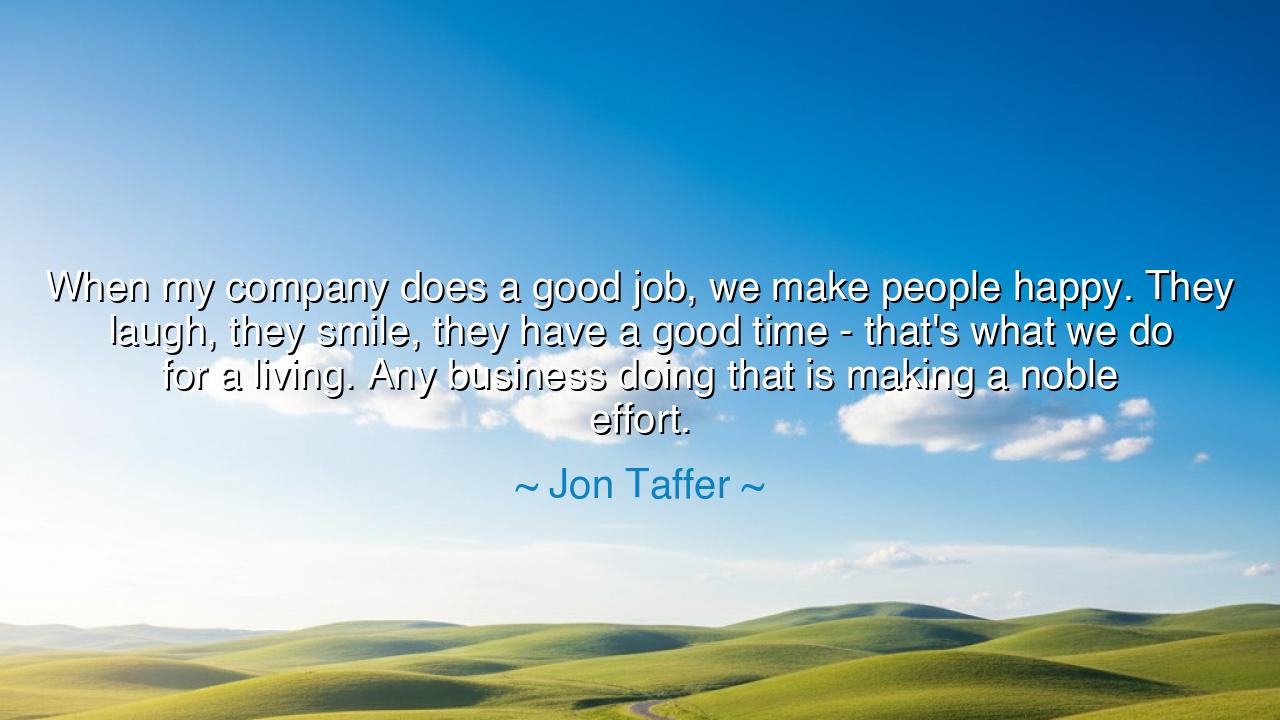
When my company does a good job, we make people happy. They
When my company does a good job, we make people happy. They laugh, they smile, they have a good time - that's what we do for a living. Any business doing that is making a noble effort.






Hearken, O seeker of wisdom, and attend to the words of Jon Taffer: “When my company does a good job, we make people happy. They laugh, they smile, they have a good time - that's what we do for a living. Any business doing that is making a noble effort.” Within this reflection lies an enduring truth: that service, joy, and the cultivation of happiness are noble pursuits, and that the purpose of labor is elevated when it brings delight to the hearts of others.
Since the earliest days, philosophers and sages extolled the virtue of work that uplifts. Aristotle taught that the highest form of human activity is that which contributes to the flourishing of society, not merely personal gain. Taffer’s insight mirrors this wisdom: a business or craft that generates laughter, smiles, and enjoyment is engaged in work of profound value, for it nourishes the spirit and binds communities together.
Consider the life of Marcus Aurelius, the Roman emperor whose governance combined duty with concern for the welfare of the people. Though he wielded power, he sought to create conditions where citizens could thrive, find joy, and experience security. In a similar manner, Taffer emphasizes that labor, when directed toward the happiness of others, transforms ordinary commerce into an instrument of societal well-being, a noble effort that extends beyond mere profit.
There is heroism in this approach to work. To dedicate oneself to the creation of happiness, to bring laughter and delight into the lives of others, requires empathy, diligence, and vision. The ancients revered those who could combine skill with service, who understood that the highest purpose of craft is to improve the human experience. Taffer’s reflection calls attention to the sacred dimension of labor when it touches hearts and uplifts spirits.
Even in modern history, this principle is evident. Walt Disney, who built an empire of imagination, understood that his purpose was not merely financial success but the creation of joy, wonder, and delight for children and families. His work fostered smiles, laughter, and inspiration, illustrating Taffer’s point: business or craft that touches the hearts of others is engaged in a form of nobility, a labor that resonates beyond the immediate transaction.
The lesson is clear: the value of one’s work is measured not solely by efficiency or profit, but by the happiness it generates. A smile, laughter, and a good time are markers of meaningful labor, and the pursuit of these outcomes elevates even the simplest profession to the level of honor. In attending to the joy of others, we find purpose, pride, and fulfillment.
From this reflection, practical counsel emerges: seek to engage in work that brings delight, to serve with empathy, attention, and skill, and to measure success not only in wealth but in the smiles of those you touch. Whether in business, art, or daily interactions, the conscious creation of joy is a noble calling, worthy of dedication and care.
Thus, let each heart carry this ancient wisdom: labor that brings happiness and delight is work of enduring value. Jon Taffer reminds us that even commerce, when aligned with empathy and joy, transcends mere transaction and becomes a force for human flourishing. To craft smiles, laughter, and meaningful experiences is to engage in a noble effort, one that ennobles both giver and recipient alike.
If you wish, I can also craft a short, audio-ready version of this reflection, with natural rises and pauses to enhance emotional resonance, making it engaging for narration. Do you want me to create that version?






AAdministratorAdministrator
Welcome, honored guests. Please leave a comment, we will respond soon